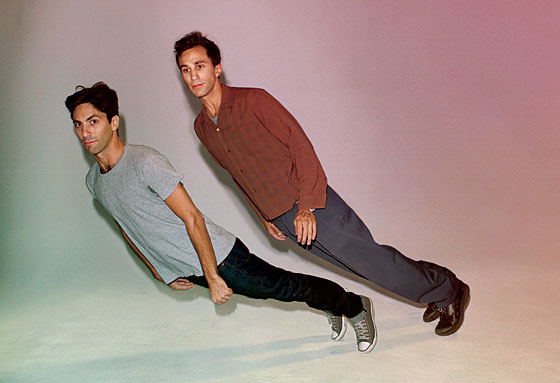
Ariel Schulman is walking me through the offices of his film-production company, Supermarché, on lower Broadway. The walls are covered in silly-clever ephemera—a huge Swatch, a stolen cardboard figure of Jim Carrey, a kitschy ad for gyros—but one piece of paper stands out. It’s a personally autographed typescript of the master filmmaker Albert Maysles’s “Documentary Manifesto.” When I point it out, Schulman begins to recite Maysles’s rules for filmmaking, adding commentary. “Remember, as a documentarian you are an observer, an author, but not a director—I actually don’t agree with that,” Schulman, known as Rel, says. “Don’t worry that your presence with the camera will change things—that’s very true, and I’m okay with that. It’s not fly-on-the-wall, that would be mindless—brilliant, right?” Eventually, he gets to one of the last rules, reading reverently. “There is a connection between reality and truth; remain faithful to both.” He crosses his arms. “I guess we did follow many of these rules.”
This fall, you’ll be hearing a lot about whether they really did. Rel and his business partner, Henry Joost, are the directors of Catfish, a documentary whose de facto star is Rel’s brother Nev. A smash at the Sundance Film Festival, bought by Brett Ratner and Relativity’s Rogue Pictures for $1.5 million, it will be released by Universal on September 17. Catfish employs no talking heads or voice-over and doesn’t include after-the-fact commentary—its action simply unspools like a scripted film’s. It is skillfully made and entertaining, predicated on our accepting Rel’s odd habit of filming his brother every single day.
The two have a close and complex relationship: Nev was an aggressively rebellious teenager, arrested at age 13 when he told an NYPD cop inspecting his scooter “something along the lines of ‘Go fuck yourself.’ ” Rel was routinely his partner in crime, or at least an accessory, as Nev crashed bikes, broke bones, and was thrown out of various schools. Along the way, Rel started shooting film. “It only makes sense to me because I’ve witnessed this arc, these events in his life that are so cinematic,” says Rel. “And I’ve missed too many of them. So I just film him constantly. He made such bold decisions, said yes so readily, and dove headfirst, literally. And it was inspiring, because I did not go as fast down the mountain, and I may not have gotten hurt, but I didn’t have a story to tell.”
His brother provided one. Catfish begins when Nev, a 22-year-old photographer, hears from Abby, an 8-year-old prodigy in Michigan who wants to paint a picture from a photo he shot. He obliges and begins corresponding with her mother, Angela. Nev becomes Abby’s friend, and soon he’s in touch with Abby’s cute 19-year-old sister, Megan. Tentatively, Nev and Megan begin a long-distance romance via e-mail, texts, and phone. Then, nine months in, Nev, Rel, and Joost uncover a startling lie and drive to Michigan to confront the family. Catfish’s intricate twists won’t be revealed here—but suffice it to say that Megan is too good to be true.
Plenty of people think the film may be, too. Nev and Rel have lately found themselves defending their work—and that year in Nev’s life—against skeptics who believe that his experience was planned or even flat-out fabricated. Super Size Me director Morgan Spurlock has called the film “the best fake documentary I’ve ever seen.” One commenter on the website Deadline Hollywood wrote that “either the hipsters were incredibly dumb or else they knew exactly what they were doing.”
Nev admits that both those statements are half-true. “I was really bored. My life was in limbo,” he says of the moment Abby appeared. He’d dropped out of Sarah Lawrence and was paying his bills by making videos for bar mitzvahs. Megan provided the fantasy of a simple life. “I was unbelievably self-convincing,” he admits. “There were so many red flags, but I was looking for an excuse to say, ‘Oh, that makes sense.’ That’s the theme of all the trouble I get into.”
Rel says he was initially uneasy about the relationship—“My first thought was sex scandal. Absolutely”—but describes willing himself into naïveté for the sake of a relationship that seemed to make his brother extremely happy. He, too, put blinders on in the service of an adventure. “I was jealous, for a fleeting moment,” he admits. “Like, how come all this exciting stuff always happens to Nev? I guess I lived vicariously through filming him.”
The movie’s marketing seems calculated to gin up questions about its truth. It’s being sold as a “reality thriller” (“because the word documentary turns people off,” Joost says). The trailer frames the film as neo-Hitchcock, with the tagline not based on a true story … not inspired by true events … just true. In a real-life twist, Andrew Jarecki—who made Capturing the Friedmans, another riveting documentary raising questions of exploitation and murky family truths—joined the team early as a co-producer, advising Rel and Joost about the film’s trickier ethical questions. Before signing on, Jarecki asked Rel how often he thought of the Michigan family. “I said, without hesitation, every single day,” Rel says. “And he said, ‘Good. Then you’re the right people to deal with presenting humanity in this way.’ ”
As with Jarecki’s film, cynics will see their viewpoint supported, and so will true believers. (For David Edelstein’s opinion, see here.) Rel sarcastically wisecracks to naysayers, “So my brother is the best actor since Brando, and we’re the best writers in Hollywood?” and robustly defends Catfish. He and Joost are already thinking about new projects, both of which draw from the same well: a reality series about online dating, maybe, and a feature thriller. They’ve laid off filming Nev, though “we still carry our cameras around all the time,” says Rel. “We’re getting ready for another phase. What could we possibly film Nev doing that would lead to something that awesome?”